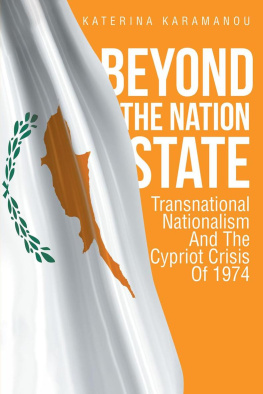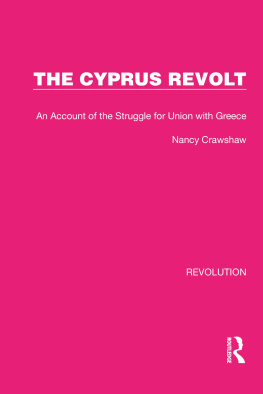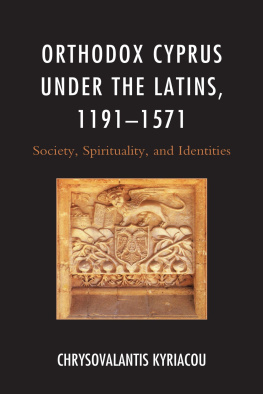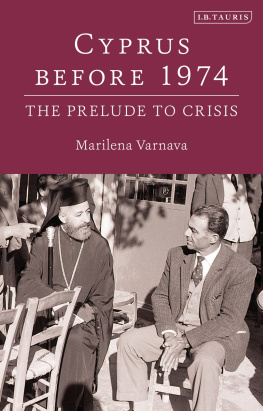Beyond The Nation State
Transnational Nationalism And The Cypriot Crisis Of 1974
Katerina Karamanou
Copyright 2019 by Katerina Karamanou
All rights reserved. No part of this publication may be reproduced, distributed, or transmitted in any form or by any means, including photocopying, recording, or other electronic or mechanical methods without the prior written permission of the publisher. For permission requests, solicit the publisher via the address below.
Christian Faith Publishing, Inc.
832 Park Avenue
Meadville, PA 16335
www.christianfaithpublishing.com
Printed in the United States of America
Table of Contents
To my children, Avraam and Melina
Acknowledgments
Have Ithaka always in your mind.
Your arrival there is what you are destined for.
But dont in the least hurry the journey.
Better it last for years,
so that when you reach the island you are old,
rich with all you have gained on the way,
not expecting Ithaka to give you wealth.
C. P. Cavafy, Ithaka
Before I started my research on Cyprus, I was thoroughly aware that I was going to encounter obstacles as I endeavored to see it fulfilled. However, as Cavafy writes in the poem Ithaka, obstacles are to be anticipated, but they must never be allowed to discourage us from achieving our goals. We must recognize that life is a process of education. We must always keep our goals at the forefront of our minds because we arrive at our destinations as those goals become fulfilled. I was aware that the obstacles and challenges along the way were only going to make my never-ending journey that much more satisfying and enriching.
Throughout this project, I had the privilege of interacting with a number of individuals. Their benevolent support has enabled me to not only successfully complete my thesis, but also directed me to discover my soul and elucidate my vision. Special thanks to Professor Alexander Catranis, Andreas Christodoulou, President Glafkos Clerides, Professor Ellen T. Comisso, Jan Dunning, Professor Marios Evriviades, Kimberly K. Holtz, Clarissa Ingram, James Ingram III, Professor Hasan Kayali, William S. King, M.D., Ambassador Frixos Kolotas, Ambassador Andreas Kyprianides, Ambassador Efstathios Lagakos, Professor Arend Lijphart, Vassos Lyssarides, Professor Marianne McDonald, Professor Victor V. Magagna, Professor David Mares, Christos Moustra, Nitsa Neophytou, Professor Paul Papayoanou, Polyvios Polyviou, Machael Sarris, Professor Gershon Shafir, Patroklos Stavrou, Ambassador Byron Theodoropoulos, Attorney General Michalakis Triantafyllides, Theodore Tsakiris, and Professor Eric Van Young.
Finally, yet as importantly, I am indebted to my familymy mother Maria Karamanou and my brothers Argiris, Sotiris, Konstantinos, and Ioanniswho have broken through the confines of our familys traditions by allowing me the opportunity to pursue my educational goals in the United States and experience life in a new and different environment. Their encouragement and support has been an inspiration to me. I conclude by acknowledging someone who is not last in my thoughts or appreciationElliot Grossman whose patience and understanding kept me going through the difficulties I faced in undertaking this project.
Katerina Karamanou
UC San Diego
Preface
The fact is that when great prosperity comes suddenly and unexpectedly to a state, it usually breeds arrogance; in most cases it is safer for people to enjoy an average amount of success rather than something which is out of all proportion.
Thucydides
Cypriot liberation from British colonial rule occurred suddenly and unexpectedly. Independence was born not as a result of the efforts of a united Cypriot people, but rather by a harsh compromise wrested from a violent struggle between the Greeks and Turks, each force striving to achieve its own objective of union while preventing the other from fulfilling partition. Ironically, the tumultuous environment from which Cyprus emerged as an independent entity ultimately sired her demise.
Cyprus, a small but strategically positioned island, is situated in the eastern Mediterranean Sea, 240 miles from Egypt, 60 miles west of Syria, 40 miles south of Turkey, and about 150 miles east of the Greek Dodecanese Islands. The third largest island in the Mediterranean Sea after Sicily and Sardinia, Cyprus is approximately 3,584 square miles in area and 59 miles in length on a north-south axis. Cyprus has a population that is approximately 80 percent Greek-speaking (Greek-Orthodox Christians), 18 percent Turkish-speaking (Sunni Muslims), and the remainder consists of a heterogeneous mixture of other minorities.
Cyprus has been subjected to more than a dozen foreign conquests over the past 3,500 years of recorded history. Notably, the Greeks inhabited Cyprus for over 3,000 years and successfully Hellenized the territory, transforming it into one of five great centers of Greek learning and tradition. Although Cyprus has been predominantly influenced by Greek culture, Turkey gained political control of the island in 1571 and retained its ruling status until 1878 when Great Britain began its occupation. In 1914, Britain formally annexed Cyprus. The island became a crown colony in 1925 after Turkey acknowledged British sovereignty in the Treaty of Lausanne. British control of Cyprus persisted until 1955.
During the 1950s, serious dissension arose between Greece and Turkey over Cyprus. In 1955 British control over Cyprus was challenged when Greek Cypriots rebelled in an attempt to sever ties with Britain and gain their independence. The large Greek population on Cyprus organized a revolutionary movement with the goal of enosis, or the union of Cyprus with Greece. Neither Britain, which regarded the island as a vital defense base, nor Turkey, which feared that a change in the status quo of Cyprus would pose a security threat, would grant the Cypriots the right of enosis. In 1959, Greek and Turkish representatives met in London to participate in negotiations with Britain concerning Cypriot independence. This independence was granted to the island in 1960. Despite its newly acquired independent status, Cyprus was beset with a constitutional crisis in 1963. The crisis continued and came to a head in 1974 when the Cypriot war broke out.
Since 1974, Cyprus has been a divided island, and Greece and Turkey have remained influential players in determining the fate of Cyprus. The events leading to bloodshed in Cyprus present us with a host of important questions. Why has the 1974 Cypriot Crisis endured? Do the politics of small states such as Greece and Turkey have a greater effect on the fate of small republics like Cyprus than do their own domestic politics? Is Cypruss domestic structure the exclusive determinant of its internal stability? Or do international relations and even interaction between the island and its neighbors need to be considered? Does nationalism play a role in states like Cyprus that are plagued by competing nationalities? Is Cyprus yet another example of the economically based relationships we have seen in Latin America?
To answer these questions, I turn to the literature of international relations and comparative politics. The former addresses the foreign policy components of the Cypriot Crisis of 1974, whereas the latter elucidates its domestic political dimensions. By combining these approaches and surpassing their narrow limits to make them engage each other, I have discovered a phenomenon I call transnational nationalism.
Transnational nationalism describes the situation when international leaders are involved in games that implicate the culture of their own countries as well as of those concerned. Cross-national cultural institutions obligate leaders to behave in certain ways, and are not merely reducible to pretexts for strategic choice. At the same time, strategic issues are real and do concern these decision makers.






